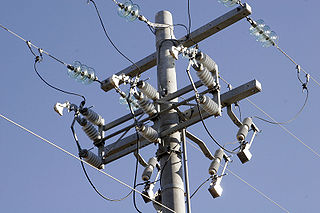Related Research Articles
Product liability is the area of law in which manufacturers, distributors, suppliers, retailers, and others who make products available to the public are held responsible for the injuries those products cause. Although the word "product" has broad connotations, product liability as an area of law is traditionally limited to products in the form of tangible personal property.

Forensic engineering has been defined as "the investigation of failures - ranging from serviceability to catastrophic - which may lead to legal activity, including both civil and criminal". It includes the investigation of materials, products, structures or components that fail or do not operate or function as intended, causing personal injury, damage to property or economic loss. The consequences of failure may give rise to action under either criminal or civil law including but not limited to health and safety legislation, the laws of contract and/or product liability and the laws of tort. The field also deals with retracing processes and procedures leading to accidents in operation of vehicles or machinery. Generally, the purpose of a forensic engineering investigation is to locate cause or causes of failure with a view to improve performance or life of a component, or to assist a court in determining the facts of an accident. It can also involve investigation of intellectual property claims, especially patents.
The state of the art refers to the highest level of general development, as of a device, technique, or scientific field achieved at a particular time. However, in some contexts it can also refer to a level of development reached at any particular time as a result of the common methodologies employed at the time.
A defect is a physical, functional, or aesthetic attribute of a product or service that exhibits that the product or service failed to meet one of the desired specifications. Defect, defects or defected may also refer to:
Caveat emptor is Latin for "Let the buyer beware". It has become a proverb in English. Generally, caveat emptor is the contract law principle that controls the sale of real property after the date of closing, but may also apply to sales of other goods. The phrase caveat emptor and its use as a disclaimer of warranties arise from the fact that buyers typically have less information than the seller about the good or service they are purchasing. This quality of the situation is known as 'information asymmetry'. Defects in the good or service may be hidden from the buyer, and only known to the seller.
Inspection in software engineering, refers to peer review of any work product by trained individuals who look for defects using a well defined process. An inspection might also be referred to as a Fagan inspection after Michael Fagan, the creator of a very popular software inspection process.
Proposition 65 is a California law passed by direct voter initiative in 1986 by a 63%–37% vote. Its goals are to protect drinking water sources from toxic substances that cause cancer and birth defects and to reduce or eliminate exposures to those chemicals generally, such as consumer products, by requiring warnings in advance of those exposures.
In contract law, a warranty is a promise which is not a condition of the contract or an innominate term: (1) it is a term "not going to the root of the contract", and (2) which only entitles the innocent party to damages if it is breached: i.e. the warranty is not true or the defaulting party does not perform the contract in accordance with the terms of the warranty. A warranty is not a guarantee. It is a mere promise. It may be enforced if it is breached by an award for the legal remedy of damages.
Consumables are goods that are intended to be consumed. People have, for example, always consumed food and water. Consumables are in contrast to durable goods. Disposable products are a particular, extreme case of consumables, because their end-of-life is reached after a single use.

In pipeline transportation, pigging is the practice of using pipeline inspection gauges, devices generally referred to as pigs or scrapers, to perform various maintenance operations. This is done without stopping the flow of the product in the pipeline.
Poka-yoke is a Japanese term that means "mistake-proofing" or "inadvertent error prevention". A poka-yoke is any mechanism in a process that helps an equipment operator avoid (yokeru) mistakes (poka) defects by preventing, correcting, or drawing attention to human errors as they occur. The concept was formalised, and the term adopted, by Shigeo Shingo as part of the Toyota Production System.
Lemon laws are United States state laws that provide a remedy for purchasers of cars and other consumer goods in order to compensate for products that repeatedly fail to meet standards of quality and performance. Although many types of products can be defective, the term "lemon" is mostly used to describe defective motor vehicles, such as cars, trucks, and motorcycles.

Forensic electrical engineering is a branch of forensic engineering, and is concerned with investigating electrical failures and accidents in a legal context. Many forensic electrical engineering investigations apply to fires suspected to be caused by electrical failures. Forensic electrical engineers are most commonly retained by insurance companies or attorneys representing insurance companies, or by manufacturers or contractors defending themselves against subrogation by insurance companies. Other areas of investigation include accident investigation involving electrocution, and intellectual property disputes such as patent actions. Additionally, since electrical fires are most often cited as the cause for "suspect" fires an electrical engineer is often employed to evaluate the electrical equipment and systems to determine whether the cause of the fire was electrical in nature.
Redhibition is a civil action available under Louisiana law against the seller and/or manufacturer of a defective product, similar to the lemon laws more familiar to common law jurisdictions in other U.S. states. Redhibition is one of many laws that are unique to Louisiana among U.S. states because of its tradition in French and Spanish civil law.
ISO 13406-2 is an ISO standard, with the full title "Ergonomic requirements for work with visual displays based on flat panels -- Part 2: Ergonomic requirements for flat panel displays". It is best known to end consumers for defining a series of flat-panel display "classes" with different numbers of permitted defects. ISO 13406-2 also provides a classification of Viewing Direction Range Classes and Reflection Classes.
Refurbishment is the distribution of products that have been previously returned to a manufacturer or vendor for various reasons, not sold in the market or new launch of a product. Refurbished products are normally tested for functionality and defects before they are sold to the public. They are repaired by the original manufacturer and resold.
AppleCare+ is Apple's brand name for extended warranty and technical support plans for their devices. AppleCare+ extends the devices one year limited warranty and the 90 days of technical support. It also includes two instances of accidental damage repair at discounted prices every 12 months. The AppleCare Protection Plan is available for many Apple products including Mac computers and displays, Beats Headphones, HomePods, iPhones and iPads, Apple Watches, and Apple TVs. AppleCare plans include Apple software associated with the covered hardware. Customers can also buy additional support and training through AppleCare.
Adulteration is a legal term meaning that a food product fails to meet the legal standards. One form of adulteration is an addition of another substance to a food item in order to increase the quantity of the food item in raw form or prepared form, which may result in the loss of actual quality of food item. These substances may be either available food items or non-food items. Among meat and meat products some of the items used to adulterate are water or ice, carcasses, or carcasses of animals other than the animal meant to be consumed.
A product defect is any characteristic of a product which hinders its usability for the purpose for which it was designed and manufactured.
The South African law of sale is an area of the legal system in that country that describes rules applicable to a contract of sale, generally described as a contract whereby one person agrees to deliver to another the free possession of a thing in return for a price in money.
References
- ↑ "Redhibitory Defect". Findlaw.
| | This legal term article is a stub. You can help Wikipedia by expanding it. |